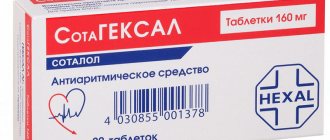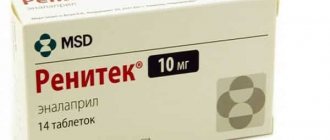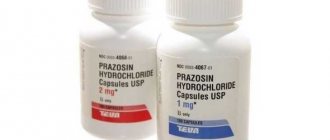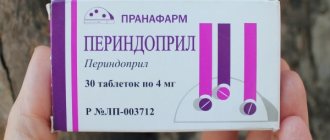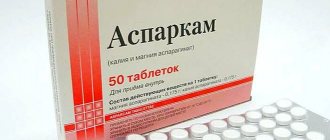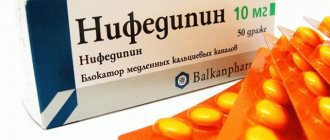24.10.2018
Diroton tablets belong to the group of ACE inhibitors; they are prescribed by cardiologists to normalize blood pressure, as part of a comprehensive treatment regimen for heart attack and cardiac pathology.
The main component in the drug is Lisinopril. It not only lowers blood pressure, but reduces the load in the vessels of the lungs, increasing the minute volume of circulating blood.
The drug is available in dosage tablets – 2.5 – 20 mg. For those who are just planning to take Diroton, the instructions for use will tell you in what dosage, but it is better not to take it yourself, but to consult a doctor.
First, the causes of the pathology are identified, diagnostics are carried out, and then adequate therapy is prescribed.
How the drug works
Being an ACE inhibitor, Diroton reduces the likelihood of the conversion of angiotensin 2 from 1, which is why the production of aldosterone decreases and prostaglandins increase. Regular use of the drug has a beneficial effect on the condition of the myocardium, reduces pressure, and dilates the arteries.
In patients with coronary artery disease, the medicine normalizes blood circulation in the myocardium. According to research data, the influence of Diroton can prolong the life of patients suffering from chronic heart failure. In an organism that has suffered a heart attack, Diroton reduces the development of pathologies of the left ventricle.
From the moment you take the tablet, the effect of the drug is detected within an hour, and its maximum effectiveness appears after 6 hours and lasts for a day. After a couple of months of therapy, it is usually possible to stabilize blood pressure; stopping the medication does not cause withdrawal symptoms.
Substitute medicines
There is a whole table of contraindications; in addition, there may be other reasons why taking the drug is impossible. Diroton and its analogs are a common topic. At the moment, there are more than a dozen medications that can be used to treat a patient if it is impossible to use Diroton.
- Taking amlodipine is a medicine that is part of the group of calcium channel blockers. Used for arterial hypertension. One of the cheapest, but quite effective drugs.
- Bisoprolol is a beta-blocker. Country of origin: Hungary. It is used for hypertension and to prevent the development of angina pectoris.
- Geraton is one of the controversial drugs for blood pressure, but some experts prefer it.
- Concor also belongs to the group of beta-blockers. Indications for use include: angina pectoris, heart failure, hypertension.
Analog – Concor
- Exforge is one of the expensive drugs that is used strictly for arterial hypertension. The medicine has a fairly quick and long-lasting effect.
The above drugs can be bought at any pharmacy, for example, in the capital, and the drugs are also available on electronic websites.
Diroton is a timely, European drug that is produced in Hungary. The medicine belongs to the group of ATP inhibitors and has a wide range of uses: hypertension, heart failure, heart attack.
In addition to a wide range of indications, Diroton has a number of conditions that preclude its use. In this regard, the drug is sold only by prescription and must be used strictly on the basis of recommendations.
Who is prescribed Diroton
Diroton tablets are used not only for blood pressure, but for various pathologies. Of a number of pathologies, the main ones in the treatment of which the drug is used are the following:
- hypertension (essential, renovascular). The drug is used as monotherapy or in combination with other medications;
- acute heart attack. Tablets are prescribed from the first day with confident hemodynamics. Diroton often becomes an element of a combined treatment regimen aimed at preventing malfunctions in the left ventricle and heart pathologies;
- chronic heart failure;
- renal failure due to diabetes. The medicine reduces albuminuria in people with insulin dependence and blood pressure within normal limits, and in patients with high blood pressure without insulin dependence.
Drug interactions
- Slows down the excretion of lithium from the body.
- NSAIDs, estrogens, and sympathomimetics reduce the hypotensive effect.
- When used simultaneously with potassium-sparing diuretics and potassium supplements, hyperkalemia is possible.
- Antacids and cholestyramine reduce absorption from the gastrointestinal tract.
- Combined use with beta blockers, calcium channel blockers, diuretics and other antihypertensive drugs enhances the severity of the hypotensive effect.
How to take blood pressure pills
1 tablet of Diroton of suitable dosage per day is enough, it is advisable to take the medicine in the morning, before meals or after - it doesn’t matter. At first, 10 mg of the drug is prescribed, later the dosage is gradually increased to 20 mg. After about 2-4 weeks of regular use, the maximum effect of the medicine is achieved.
If the patient has previously taken diuretics, they should be discontinued 2 days before taking Diroton. If this option is undesirable, then the dosage of Diroton is reduced to 5 mg.
If hypertension is provoked by problematic blood supply to the kidneys, Diroton therapy is started with 2.5 mg, and then the rate of maintenance therapy is selected based on the tonometer readings. In case of heart failure, blood pressure tablets are combined with diuretics and digitalis medications. If kidney pathology is detected, the doctor takes into account creatine clearance before calculating the dosage of the drug. Therapy is started with 2.5-10 mg, and the maintenance dosage is subsequently calculated taking into account the pressure.
During treatment for acute heart attack, Diroton pills will become part of an integrated approach. On the first day - 5 mg, then take a day off and repeat the dose, then after 2 days - 10 mg of the drug, then 10 mg daily. During treatment, the drug is taken in a course of 1.5 months.
For low systolic pressure, cardiologists prescribe 2.5 mg of Diroton, but if after the control time the pressure remains low, then the tablets should be discontinued.
Composition, release form and packaging
Diroton is produced:
- In the form of tablets, flat, white or almost white, disc-shaped, with a chamfer, marked “2.5” on one side and a line mark on the other.
Active ingredients: 1 tablet contains 2.72 mg of lisinopril dihydrate, which is the same as 2.5 mg of lisinopril.
Additional components: mannitol, magnesium stearate, calcium hydrogen phosphate dihydrate, corn starch, talc.
In a cardboard package - 1 blister with 14 tablets.
The cardboard package contains 2 blisters, each with 14 tablets.
- In the form of tablets, flat, white or almost white, disc-shaped, with a chamfer, marked “5” on one side and a line on the other.
Active ingredients: 1 tablet contains 5.44 mg of lisinopril dihydrate, which is the same as 5 mg of lisinopril.
Additional components: mannitol, magnesium stearate, calcium hydrogen phosphate dihydrate, corn starch, talc.
In a cardboard package - 1 blister with 14 tablets.
In a cardboard package there are 2 blisters, each with 14 tablets.
In a cardboard package there are 4 blisters, each with 14 tablets.
- In the form of tablets, quadrangular, white or almost white, biconvex, marked “10” on one side and a line mark on the other.
Active ingredients: 1 tablet contains 10.89 mg of lisinopril dihydrate, which is similar to 10 mg of lisinopril.
Additional components: mannitol, magnesium stearate, calcium hydrogen phosphate dihydrate, corn starch, talc.
In a cardboard package - 1 blister with 14 tablets.
In a cardboard package there are 2 blisters, each with 14 tablets.
In a cardboard package there are 4 blisters, each with 14 tablets.
- In the form of tablets, pentagonal, white or almost white, biconvex, marked “20” on one side and a line mark on the other.
Active ingredients: 1 tablet contains 21.77 mg of lisinopril dihydrate, which is similar to 20 mg of lisinopril.
Additional components: mannitol, magnesium stearate, calcium hydrogen phosphate dihydrate, corn starch, talc.
In a cardboard package - 1 blister with 14 tablets.
In a cardboard package there are 2 blisters, each with 14 tablets.
In a cardboard package there are 4 blisters, each with 14 tablets.
Features of taking the drug
Before prescribing, the doctor must normalize the patient’s blood pressure if it is impaired by diuretics, low salt content in food, diarrhea or vomiting. The doctor needs to monitor the sodium content in the patient’s body, increase it if necessary, and restore the water balance.
When Lisinopril is prescribed after major surgery or potent medications that lower blood pressure, a sharp drop in blood pressure may occur. It is important to regularly examine blood counts in the laboratory, because heart failure, together with kidney failure, can also lead to an excessive drop in blood pressure. In case of impaired renal function, treatment with Diroton is carried out under the supervision of a doctor, the dosage is calculated carefully.
Combining Diroton and alcohol is not recommended, since ethanol enhances the blood pressure-lowering effect. You need to be especially careful during physical activity in hot weather, since dehydration in such situations increases and blood pressure can drop to dangerous levels.
If dizziness occurs or reaction decreases while taking the drug, you should not drive a vehicle or perform work that requires concentration.
Interaction of Diroton with other drugs
Diroton, when used in parallel with diuretics that accumulate potassium in the body, increases the risk of hyperkalemia. A similar effect awaits those who take blood pressure pills in parallel with potassium supplements or a salt substitute with added potassium. Patients with kidney disease are at increased risk. The combination of the above medications is possible only according to individual indications, and the doctor must monitor kidney function and potassium levels.
When combining Diroton therapy with diuretics and other blood pressure medications, there is a high risk of a serious drop in blood pressure. A similar result awaits those who take a daily dose of diroton while taking calcium channel blockers.
When interacting with sodium aurothiomalate and gold-based medications intravenously, nausea appears and vomiting occurs, and all this against the background of redness of the skin and a sharp drop in pressure. A drop in blood pressure is also possible while taking tricyclic antidepressants, barbiturates, and ethanol. Conversely, if Diroton is taken against the background of other anti-inflammatory drugs, the effect of blood pressure pills is reduced. A similar drop in the hypotensive effect occurs when combined with estrogens.
Side effects
The side effects of Diroton noted by the manufacturer in the instructions for use correspond to most drugs of this pharmacological group.
The list of side effects of Diroton, like other ACE inhibitors, includes:
- intolerance to components in the medication;
- allergic reactions;
- angioedema;
- a pronounced decrease in pressure and associated weakness, headaches, fainting;
- dry cough.
Dyspeptic symptoms such as nausea, vomiting and diarrhea are quite rare. The instructions for use include side effects such as decreased hemoglobin and hematocrit, agranulocytosis, and an increase in erythrocyte sedimentation rate. This condition occurs only with long-term use. Increased levels of creatinine, potassium and urea nitrogen are also possible.
Adverse reactions from Diroton
Considering the number of negative reactions that Diroton can cause, you should not prescribe it yourself. The instructions indicate the following adverse reactions:
- chest pain, sharp drop in pressure, bradycardia, heart attack;
- manifestation of allergies on the skin - hives and itching, symptoms of hyperhidrosis, swelling of the face and arms/legs;
- disorders of the gastrointestinal tract - abdominal pain, vomiting, diarrhea. Complaints of dry mouth are often detected, and sometimes symptoms of hepatitis and pancreatitis;
- from the respiratory system - apnea, coughing attacks, spasms in the bronchi;
- parts of the nervous system react with decreased attention, excessive fatigue from usual activities, and unscheduled sleepiness. Nervous tics and fainting may occur;
- the medicine causes problems with potency, uremia, and kidney failure;
- blood tests reveal a decrease in hemoglobin against the background of an increase in ESR;
- fever.
Overdose
When ingesting large doses of the drug or prolonged uncontrolled use of tablets, patients gradually develop signs of overdose, which are manifested by the following symptoms:
- Tachycardia, confusion;
- Dry mouth, severe thirst;
- Lethargy and apathy to what is happening, decreased reflexes.
- Marked decrease in blood pressure, collapse, acute vascular insufficiency.
If such clinical symptoms develop during treatment with Diroton, the patient should be immediately taken to the hospital. Treatment of overdose consists of gastric lavage, ingestion of activated carbon and symptomatic therapy if necessary.
Who should not take Diroton?
Not every patient can be prescribed this blood pressure medication by a doctor. There are a number of contraindications in which the doctor will have to select a different medicine for the patient.
Contraindications are:
- allergy to medication components;
- recent kidney transplant;
- renal artery stenosis;
- renal failure;
- minor age;
- poor readings of a biochemical blood test, in particular, excess potassium.
The drug is not prescribed to pregnant and lactating women, except in a condition where the patient’s life is at risk. The same applies to breastfeeding - if blood pressure pills are needed, the child is transferred to artificial formula.
Diroton is prescribed with caution for complex diabetes, 2-sided stenosis of the renal arteries, and chronic heart failure. You should not take Diroton if you have scleroderma and lupus erythematosus.
Even if the drug is approved for use, you must carefully follow the regimen recommended by your doctor so as not to cause an overdose. Symptoms of drug intoxication are as follows:
- failure of electrolyte balance;
- circulatory shock;
- a sharp drop in pressure;
- hyperventilation;
- renal failure;
- painful dry cough;
- tachycardia and bradycardia;
- unrelated anxiety;
- dizziness.
Overdose requires symptomatic treatment. It is necessary to call an ambulance, rinse the patient’s stomach, prescribe sorbents and bed rest. In case of excessive intoxication, hemodialysis should be performed.
If the patient cannot take Diroton, the doctor will select a medicine from another group that has the same effect. The closest analogue is hydrochlorothiazide, which reduces blood pressure by dilating arterioles. Other medications that are prescribed instead of Diroton are: Dapril, Sinopril, Irumed.
Contraindications to the use of Diroton
The instructions prohibit the use of the drug Diroton when:
- hypersensitivity to lisinopril;
- primary aldosteronism (tumor of the adrenal cortex with the formation of excessive amounts of aldosterone);
- stenosis (narrowing) of the renal arteries;
- decompensated renal failure;
- aortic stenosis;
- changes in biochemical blood parameters.
The use of Diroton is contraindicated during pregnancy, lactation and children under 16 years of age.
Reviews
According to reviews from doctors and patients, Diroton copes with the assigned task. Adverse reactions, despite their large number, are rare. Mostly patients encountered negative reactions when overdosing the drug.
Cardiologists note that unpleasant side effects in their practice occur in the form of individual intolerance to the drug components. In such a situation, the solution to the problem is to replace the medication.
In general, Diroton does a better job of lowering blood pressure as part of a complex treatment, whereas a single drug is not as effective. The price is affordable, which suits patients who have to take antihypertensive drugs for a long time.
To avoid negative reactions and get only a positive impression, you need to take it strictly as prescribed by your doctor, following the dosage and other recommendations of the cardiologist for correcting your regimen, lifestyle, nutrition, etc.
Contraindications and side effects
There are a number of body conditions in which the use of Diroton can be dangerous. This drug should not be prescribed in the following cases:
- hypersensitivity to the components of the drug (ascertained from the patient during the collection of an allergy history);
- pregnancy period;
- women who are breastfeeding;
- childhood and adolescence (taking medication before age eighteen may be unsafe);
- patients taking aliskiren drugs;
- with bilateral narrowing of the supplying renal vessels.
Most often, the use of the drug leads to the following complications:
- inhibition of hematopoietic function;
- allergic reactions;
- decreased blood glucose concentration;
- psychoses.

